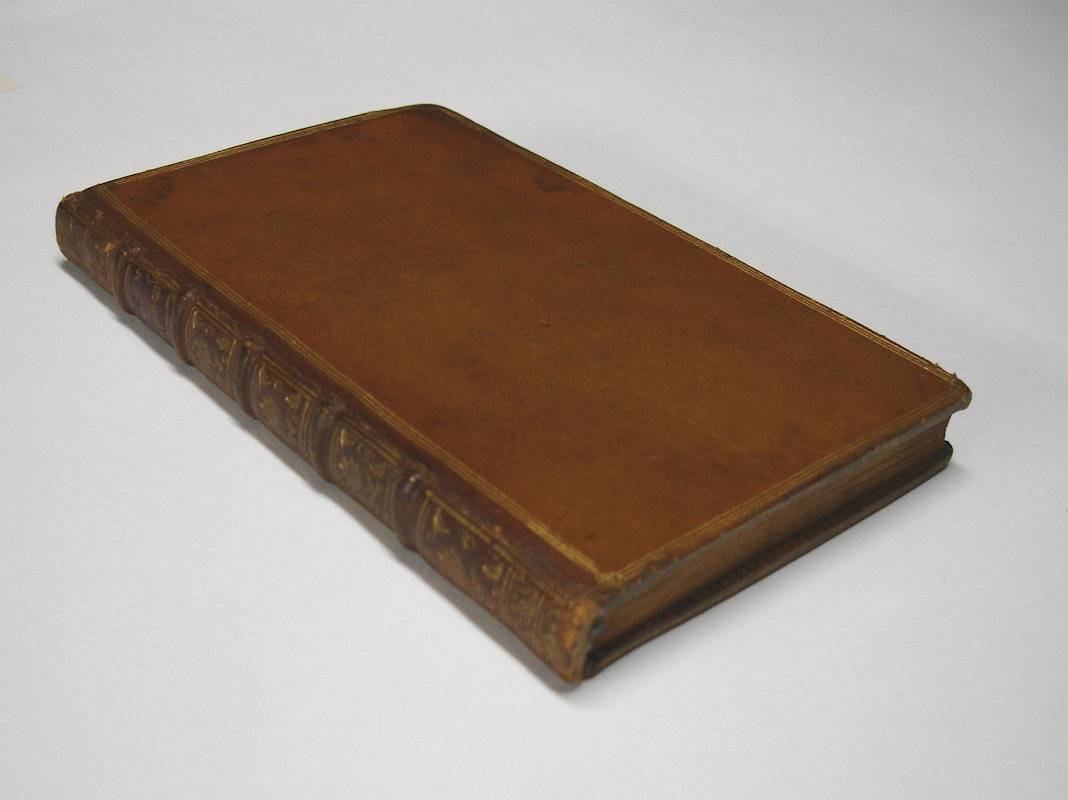AESCHYLUS.
AISCHULOU, PROMETHEUS DESMÔTÊS, HEPTA EPI THÊBAIS, PERSAI, AGAMEMNÔN, EUMENIDES, HIKETIDES.
Paris (Parisiis), Ex officina Adriani Turnebi Typographi Regij, 1552.
12mo. (VIII),1-211,(1) p. 18th century calf 16.5 cm (
Ref: Wartelle p. 2. Hoffmann I,32: 'Eine schöne und seltene Ausgabe'. Dibdin 1,237: 'beautifully printed'. Moss 1,7: 'a beautiful edition'. Brunet I, 77. Graesse 1,29. Ebert 180. Gruys p. 31/46; Mund-Dopchie p. 45/83) (
Details: Back with 5 raised bands, the compartments with gilt floral motives. Red morocco shield in the second compartment. Triple fillet gilt borders on both boards. Gilt inside dentelles. Bookblock with gilt edges. Marbled endpapers. Woodcut printer's mark on the title) (
Condition: Some wear to the extremes of the binding. Some foxing. Marginal repairs in 3 leaves) (
Note: The Greek tragedian Aeschylus, 525/4-456 B.C., is the earliest of the surviving tragic playwrights. He 'can be considered the 'inventor' of tragedy as we understand it'. (The Classical Tradition, N.Y., 2010, p. 10) He became an instant classic in his time. In Byzantine times seven of his plays, the so called
heptas, continued to be copied and studied, but in the West he was forgotten for almost one and a half thousand years. In the Renaissance he was revived with the arrival of Greek manuscripts in the West, and by the printing press. The oldest of the more than 100 surviving Aeschylean manuscripts dates from ca. 1000, and was written in Constantinople. It was brought to Florence by the Italian humanist G. Ausrispa. Aeschylus was published by Aldus in Venice in 1513. It was only in the late 18th century that Aeschylus was translated into French and German. 'From that time forward, interest in Aeschylus blossomed. The character of his language and thought (...) formerly a stumbling block, became a virtue for the new Romantic sensibility, aided perhaps by the fact that the Age of Revolution saw the Aeschylean Prometheus as the archetypal hero of defiance. In this regard the 'continuation' of
Prometheus Bound by Herder (
Der entfesselte Prometheus, 1802; choruses set to music by Liszt, 1850-1855)
and Shelley (
Prometheus Unbound, 1820) are of particular importance'. (Op. cit.) In the play Zeus is represented as a harsh and unjust tyrant. Aeschylus' authorship of the Prometheus is however disputed on metrical and stylistic ground, and with respect to the content.
§ The French eminent humanist scholar Adrien Turnebus, 1512-1565, 'was a specialist in Greek textual criticism. From 1552-1556 he was Director of the Royal Press, and, in that capacity, published a series of Greek texts, including Aeschylus (1552) and Sophocles with the scholia of Triclinius (1553)'. (Sandys, 2,186) In 1547 Turnebus was appointed Professor Regius at the Collège Royal. 'Turnebus himself says the following on his sources and working method in his Greek foreword (of this Aeschylyus edition); after he had started work on this edition, he found his task more difficult than he had originally expected, on account of the excessive corruption of the text (i.e. Aldus); as a good physician he has attempted to heal the patient by both due caution and thoroughness; may the gentle reader sooner be grateful to him for his successes than blame him for his failures. Fortunately he had been given an old ms. of the triad by Aimar de Ranconet so that he had had a sound basis for its emendation, but correction of the other tragedies was extremely difficult through the lack of mss.; yet there too he had been able to emend considerably with the aid of the scholia and by conjecture'. (Gruys p. 35)) (
Collation: alpha4, A-N8, O2) (Photographs on request)
Book number: 120201 Euro 1500.00
Keywords: (Oude Druk), (Rare Books), Aeschylus, Aischylos, Greek literature, Griechische Literatur, Tragödie, antike altertum antiquity, tragedy
 AESCHYLUS.
AESCHYLUS.